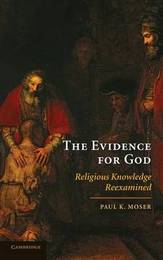
|
The Evidence for God: Religious Knowledge Reexamined
Hardback
Main Details
| Title |
The Evidence for God: Religious Knowledge Reexamined
|
| Authors and Contributors |
By (author) Paul K. Moser
|
| Physical Properties |
| Format:Hardback | | Pages:292 | | Dimensions(mm): Height 235,Width 157 |
|
| ISBN/Barcode |
9780521516563
|
| Classifications | Dewey:212 |
|---|
| Audience | | Tertiary Education (US: College) | | Professional & Vocational | |
|---|
|
Publishing Details |
| Publisher |
Cambridge University Press
|
| Imprint |
Cambridge University Press
|
| Publication Date |
30 November 2009 |
| Publication Country |
United Kingdom
|
Description
If God exists, where can we find adequate evidence for God's existence? In this book, Paul Moser offers a perspective on the evidence for God that centers on a morally robust version of theism that is cognitively resilient. The resulting evidence for God is not speculative, abstract, or casual. Rather, it is morally and existentially challenging to humans, as they themselves responsively and willingly become evidence of God's reality in receiving and reflecting God's moral character for others. Moser calls this 'personifying evidence of God,' because it requires the evidence to be personified in an intentional agent - such as a human - and thereby to be inherent evidence of an intentional agent. Contrasting this approach with skepticism, scientific naturalism, fideism, and natural theology, Moser also grapples with the potential problems of divine hiddenness, religious diversity, and vast evil.
Author Biography
Paul K. Moser is Professor and Chair of Philosophy at Loyola University, Chicago. He is author of The Elusive God (Cambridge University Press, 2008), editor of Jesus and Philosophy (Cambridge University Press, 2008), and co-editor of Divine Hiddenness (Cambridge University Press, 2002) and The Rationality of Theism (2003). He is also Editor of the journal American Philosophical Quarterly.
Reviews'There is much in this readable and pointed book that will interest and challenge both philosophers and theologians, and the epistemological reorientation Moser develops has the potential to significantly alter debates in current philosophy of religion, and for the better.' Patrick B. Arnold, The Review of Metaphysics 'This is a powerful and highly thought-provoking book, always meticulously argued, but also written with the kind of overt emotional commitment that is rare in contemporary philosophy of religion, particularly that dealing with epistemological questions.' The Times Literary Supplement
|